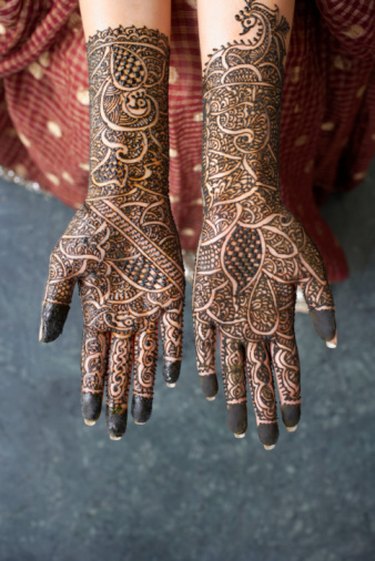
Henna tattoos allow you to connect your body with history, albeit only temporarily. Women and men throughout Africa, Asia and the Arab world use henna (or Mehndi) in wedding ceremonies, as body decoration and to symbolize status. But, just like any time you put a chemical on your skin, you risk allergic reactions. Additionally, you must consider factors like selecting a tattoo image, the skill of the tattoo artist and whether you are capable of caring for the tattoo. Knowing the disadvantages of henna tattoos enables you to make an informed decision as to whether or not to decorate yourself with a temporary tattoo.
Lack of Permanance
Video of the Day
Although henna tattoos are popular perhaps because of their lack of permanence, many people can find themselves disappointed in the constant application process, especially with highly detailed designs. For intricate elements, the inking process can take hours, and repeating this weekly can take time away from other things. However, henna tattoos' lack of permanence can work as a solution: you can use henna to sample a new tattoo before getting permanent ink.
Video of the Day
Aftercare
One disadvantage of henna tattooing is that you must follow certain aftercare procedures in order to retain the color and increase longevity. According to Henna Tattoos, this means avoiding sun during the development phase of the tattoo (two days), avoiding hot showers, changing your bathing routine and avoiding contact with any cleaning supplies. These care instructions make it clear that applying a henna tattoo requires a level of commitment that could tax some wearers. (See Reference 4.)
Lack of Colors
A major disadvantage to people with certain skin tones or who want colorful images, natural henna only comes in one color: brown. Additionally, adding image depth through shades and tones proves difficult. For this reason, henna tattoos are only advantageous with single-color designs and with light to medium skin tones.
Possible Reactions
Black henna dye contains certain chemicals that brown henna dyes do not contain, specifically p-Phenylenediamine (PPD). As reported by Human Canvas and Baylor University, PPD can cause a severe allergic reaction, resulting in itching, blistering and eventually in long-term scarring, cancer or liver damage. (See References 1 & 3.)
For those that want a temporary henna tattoo, avoid black ink unless you test a patch of skin beforehand.